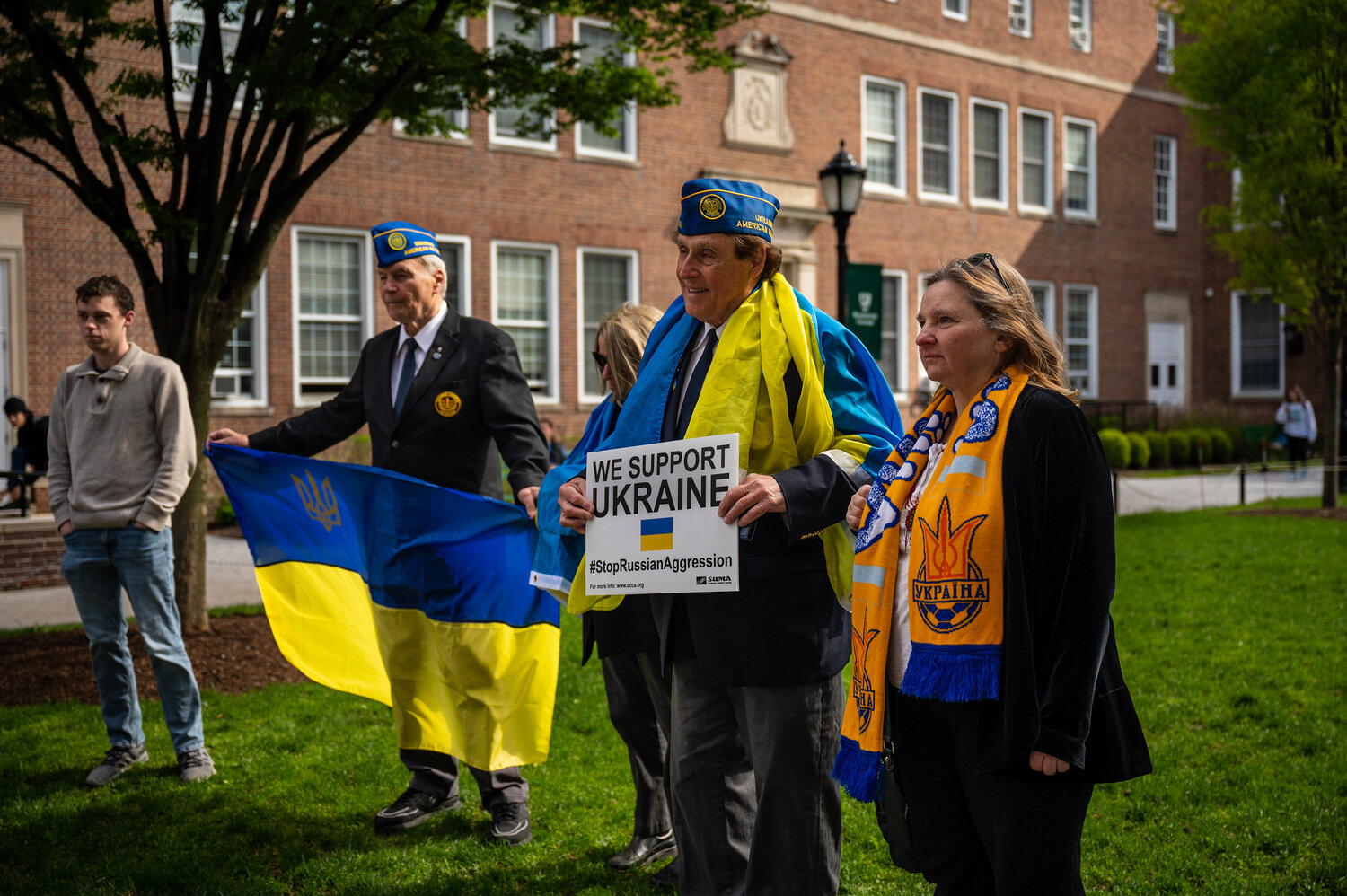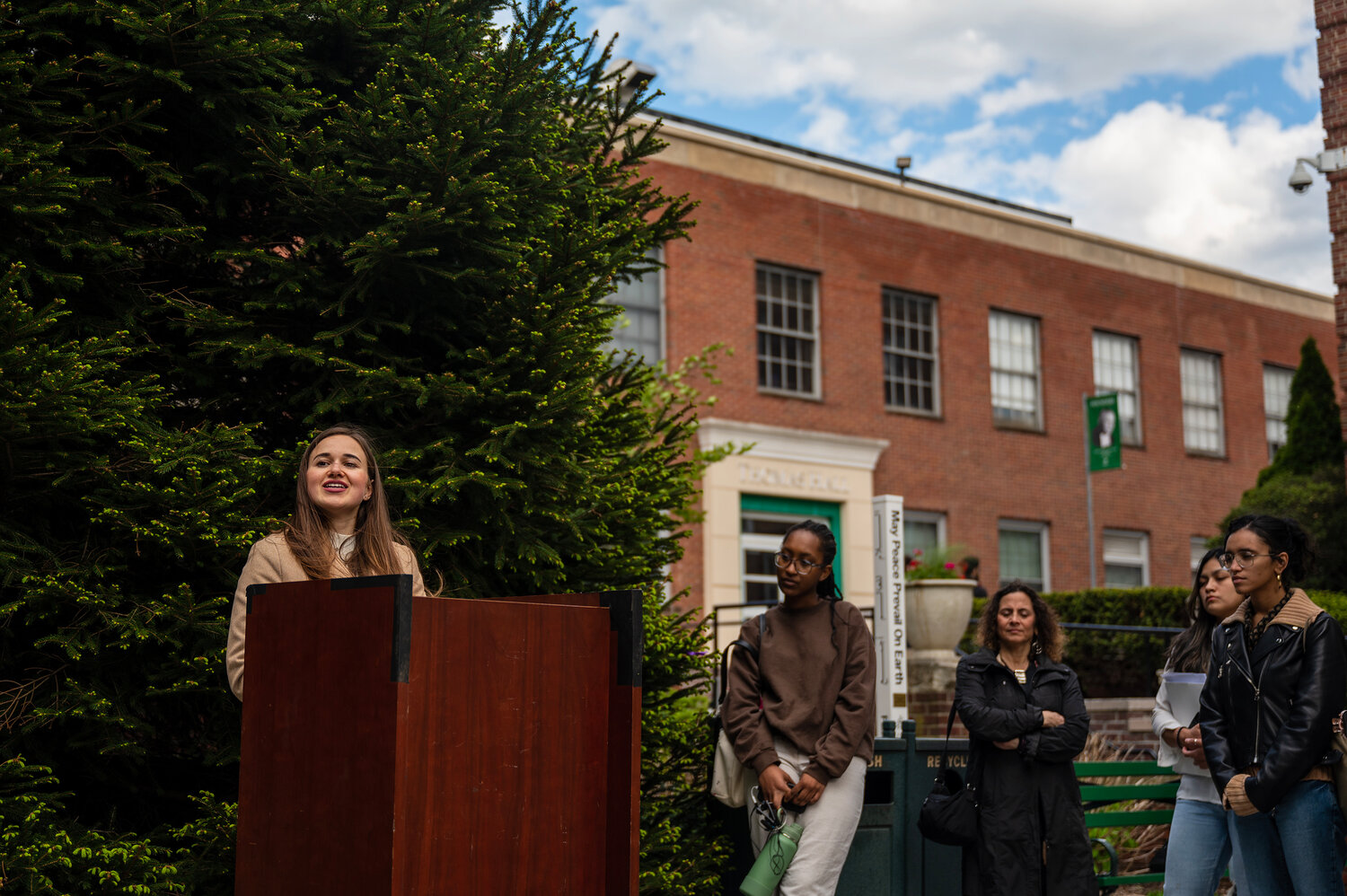As war continues, more seek peace
Students, faculty from Manhattan College gather to not let anyone forget
Houses, villages, and enterprises destroyed. Families torn apart where children were abducted. More than 300,000 casualties. Ukraine still suffers, more than 420 days since the Russians first invaded their country.
On Monday, May 1, Manhattan College, in partnership with the Ukraine Congress Committee of America Westchester branch, several Ukrainian supporters from Westchester and the college stood tall at the school’s Quad wrapped in Ukrainian flags, supporting their brothers and sisters in Ukraine.
Mehnaz Afridi, the director of the college’s Holocaust, Genocide & Interfaith Education Center, helped organize the gathering for peace. She is a religious studies professor teaching about Islam and the Holocaust. Her classes focus on issues of religion, politics, and theology.
As a Holocaust scholar, this war is a “huge” moment for her. She believes it is no different from the Holocaust because Germany seized countries and invaded them. As well as in 1992-95 where Serbia was sent out to ethnically cleanse Bosnia by removing Muslims known as Bosniaks. Serbia drove Bosniaks into concentration camps, women and children were raped, and other civilians were murdered.
Afridi noticed that the crowd was relatively small for a significant political issue. However, she believes there must be a Ukrainian presence on campus even when students walk by and see the flags and posters.
“I think it’s important for students to recognize and think, oh my God, this is still going on, and not to forget,” she said. “To me, a rally for peace means, regardless of anything, you don’t want war. The Ukrainians really want peace; that’s why it is important to call it a rally for peace one year later.”
She has also described the war as a crime. Video footage shows men were executed. Also, Russian military forces committed war crimes against civilians around Ukraine. These include rape used as a weapon, execution, and more, she added.
An international studies and history major at Manhattan College, Joshua Whipple, said Russia would need to regain its humanity.
Whipple, Jazi Riley, and Kathryn Slotterback took time off from studying for finals during the last week of the Manhattan’s semester to listen to a call for peace.
These students are not Ukrainian, but they have a deep connection to the country as they represented Ukraine in the Model United Nations conference, which gives students the unique opportunity to experience what it is like to be a delegate and better understand the inner workings of the United Nations.
In the Model U.N., 16 Manhattan College students were separated into specific assemblies and gave speeches and wrote and voted on resolutions like actual U.N. delegates. The college participates in two conferences yearly, one in New York and another in Washington, D.C.
“I was representing Ukraine, but I felt like I wasn’t doing it justice because it’s not enough. With speeches, you get the message out there to hundreds of people, but it’s such an undertaking,” Whipple said.
They collaborated with Ukrainian students who are initially from Kyiv and Lviv at the conference and before it.
“I think we are really desensitized to violence because everyone — every age and gender — are being affected by this, and we’re just so oblivious at times,” said Slotterback, a political science student. “Like we’re talking now — right now, actively, people are living in fear and terror.”
During a Google Meet conference, one Ukrainian student was sharing a story about her friend being a prisoner of war. During the Google Meets, she received a phone call claiming her friend will be released.
The former President of the Ukrainian Congress Committee of Westchester County, Jaroslaw Kiciuk, said the war was unprovoked, but knowing President Vladimir Putin’s history, it was not a surprise.
“Remember Finland, Chechnya, Georgia, Syria, Moldova, and of course Ukraine. Putin is trying to erase Ukraine as a nation just as Stalin did in the 1930s,” Kiciuk said in referring to the Russo-Finnish war of 1939 when he referred to Finland.
Putin has strong partners, which scares Afridi because it makes him powerful. China is in the mix. Especially after Chinese President Xi Jinping arrived in Moscow for a three-day visit in March. The two countries have grown closer over the past several years. As China’s imports and Russian oil have increased, so did their relationship.
“It’s the major source of imports, including dual-use imports and civilian chips, that enable Putin’s war economy going. When China stands next to you or behind you, you can say that you are not isolated,” said Alexander Gabuev — Sacha senior fellow at the Carnegie Endowment for International Peace from Geneva. Gabuev made that comment in an interview with PBS foreign affairs and defense correspondent Nick Schifrin.
Yulia, a Ukrainian immigrant from the Westchester branch of the Ukraine Congress Committee of America, and members of their local Ukrainian communities showed up to the rally.
“Peace can only be attained by Russia losing and Ukraine getting back the territories that Russia has occupied. There is no ability to talk to Russia about this until they go back to where they came from,” Yulia said.
As of right now, people who support Ukraine who are far away and want to help — what could they do? Contact political leaders both nationally and locally and ask for more continuous aid since Ukraine is not fighting for its land but for democracy around the world, according to some of the speakers.










